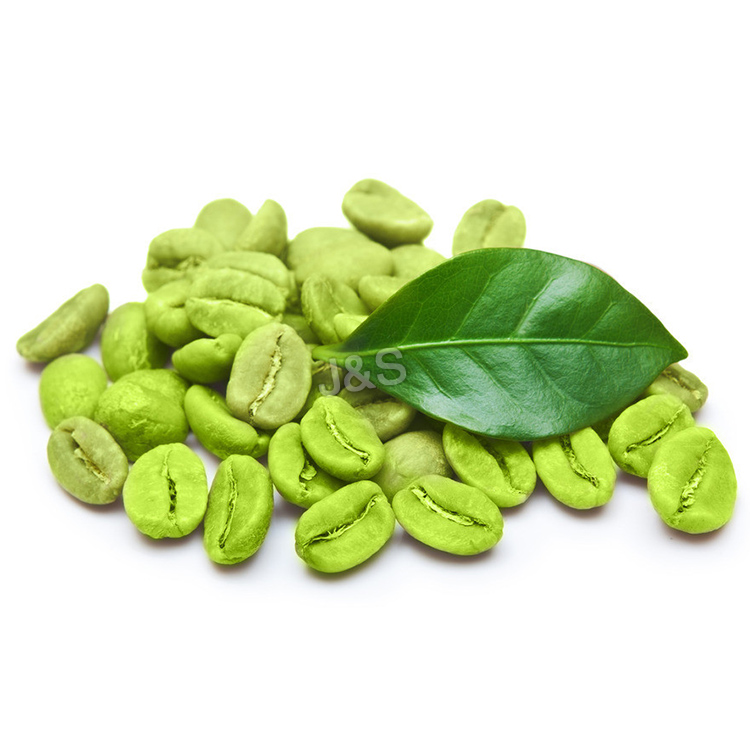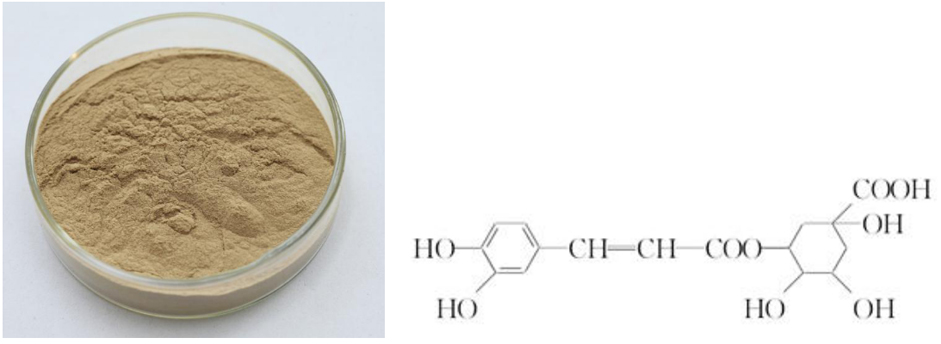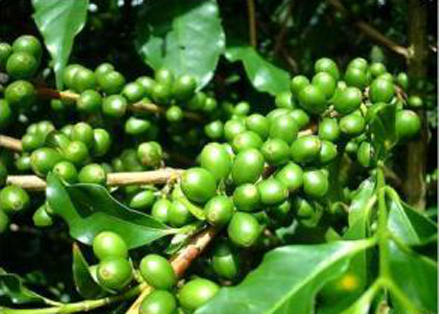High Performance Green Coffee Bean Extract Wholesale to Frankfurt
High Performance Green Coffee Bean Extract Wholesale to Frankfurt Detail:
[Latin Name] Coffea arabica L.
[Plant Source] from China
[Specifications] chlorogenic acid 10%-70%
[Appearance] Yellow brown fine powder
Plant Part Used:Bean
[Particle size] 80 Mesh
[Loss on drying] ≤5.0%
[Heavy Metal] ≤10PPM
[Storage] Store in cool & dry area, keep away from the direct light and heat.
[Shelf life] 24 Months
[Package] Packed in paper-drums and two plastic-bags inside.
[Net weight] 25kgs/drum
[Brief Introduction]
Green Coffee Bean Extract is sourced from Europe and is standardized to more than 99% Chlorogenic Acid. Chlorogenic Acid is the compound present in coffee. Which has been long known as for its beneficial properties. This active ingredient akes Green Coffee Bean an excellent agent to absorb free oxygen radicals; as well as helping to avert hydroxyl radicals, both which contribute to degradation of cells in the body.Green Coffee Beans have strong polyphenols which act to help reduce free oxygen radicals in the body, but it is standardized to more than 99% Cholorgenic Acid, a dietary polyphenol that helps to regulate metabolism.Test results showed Green Coffee Bean had more than double the rate of oxygen radical absorbance capability when compared to green tea and grape seed extracts
[Main Functions]
1.Chlorogenic acid, long known as an antioxidant with potential anti-cancer activity, also slows the release of glucose into bloodstream after a meal.
2.lower one’sblood sugar level, suppress the appetite, lower blood pressure, and reduce levels of visceral fat.
3.Useful in fighting the free radicals in our bodies that can damage our cells and contribute to conditions such as cardiovascular disease. Test results
showed Green Coffee Bean had more than double the rate of oxygen radical absorbance capability when compared to green tea and grape seed extracts.
4.Act as an effective painkiller especially for migraine medications;
5.Reduce the risk of diabetes.
Product detail pictures:

Related Product Guide:
Our firm aims to operating faithfully, serving to all of our shoppers , and working in new technology and new machine consistently for High Performance Green Coffee Bean Extract Wholesale to Frankfurt , The product will supply to all over the world, such as: Denmark, Paraguay, Honduras, In order to carry out our goal of "customer first and mutual benefit" in the cooperation, we establish a specialist engineering team and a sales team to supply the best service to satisfy our customers' requirements. Welcome you to cooperate with us and join us. We have been your best choice.
Kalmegh [ANDROGRAPHIS PANICULATA]
Kalmegh (Andrographis paniculata) is an important medicinal herb in India and it is widely used as hepatoprotective, immunomodulator, anti–inflammatory, anti–malarial, anti-diarrhoeal and with beneficial effect on respiratory and cardiovascular systems.
Kalmegh is a bitter annual (perennial, if maintained) herb, erect, 50 cm to 1m. in
height, stem quadrangular, much branched; leaves opposite, short petioled; flowers
in racemes. Fruit capsule linear, oblong or elliptic; seeds about 12 in number, subquadrate,
brownish or creamy yellow.
COMMON NAMES: Kirayat, Hara-chiretta, Kalpnath.
DISTRIBUTION:
It is widely distributed throughout plains of India from Uttar Pradesh to Assam,
Madhya Pradesh, Tamil Nadu and Kerala.
PART USED: Whole plant
CULTIVATION:
Nursery beds under shade-net supported better seedling growth. A shed net with 75% light reduction helped in early production of maximum number of seedlings ready for transplanting which would be helpful in preparedness for early monsoon. Lower soil temperature under shade–net might be one of the reasons for better plant stand and growth. Shade also reduced temperature fluctuation within day time at 1–3 cm soil depth. Mulching of nursery beds helped in conservation of soil moisture for longer period and one irrigation could be saved compared to no–mulching. Hence, nursery beds may be prepared under the 75% shade–net between last week of May and beginning of June with afore mentioned seed rate, spacing and nutrient dose followed by mulching to produce more than 600 and 750 seedlings ready for transplanting from 1m2 area by 35 and 42 days after sowing, respectively.
SOIL AND CLIMATE
It can be cultivated on wide range of soils from loam to lateritic soils with moderate
fertility. It can be cultivated on shady wastelands also.
The climatic requirement of the plant is hot and humid conditions with ample
sunshine. With the onset of monsoon, plant grows luxuriantly and starts flowering
with the moderation in temperature during September. Flowering and fruiting
continues upto December until temperature drops drastically in Northern plains.
NURSERY RAISING AND PLANTING
Its propagation is through shattered seeds in nature. Vegetative propagation is also
possible in certain special cases through layering as each node is capable of
producing enough roots. Seeds are small and remain dormant for five to six months.
For raising crop in one hectare three beds of 10×2 m size should be tilled, pulverized
and levelled during the month of May. Liberal use of organic manure in nursery is
advised for raising healthy seedling. Seeds should be covered by very thin layer of
soil and compost mixture. Beds should be covered properly by suitable mulch and
irrigated regularly with water fountain till seedlings merge (6-7 days).
Immediately after germination, mulch is removed to avoid elongation of the
seedlings. After 10-15 days regular flood irrigation can be given till it becomes ready
for planting.
Transplanting of seedling is done in second fortnight of June at a row and plant
spacing of 45 to 60 cm and 30 to 45 cm respectively. Beds should be irrigated
immediately after planting.
THINNING AND WEEDING
To begin with one or two weeding/hoeing are essential to get the crop established.
After establishment, crop grows well during monsoon and does not face any
competition from weed.
MANURES, FERTILISERS AND PESTICIDES
The medicinal plants have to be grown without chemical fertilizers and use of
pesticides. Organic manures like, Farm Yard Manure (FYM), Vermi-Compost, Green
Manure etc. may be used as per requirement of the species. To prevent diseases,
bio-pesticides could be prepared (either single or mixture) from Neem (kernel, seeds
& leaves), Chitrakmool, Dhatura, Cow’s urine etc.
IRRIGATION
Fairly distributed rainfall during monsoon is sufficient to raise annual crop in
Northern states. But prior to rain 2-3 irrigations are required. Irrigation during
autumn does not show much effect on biomass yield as by that time plant is in
reproductive phase.
HARVESTING/POST HARVESTING OPERATION
Maximum herb biomass can be obtained in 90-100 days beyond which leaves start
shedding. If crop is raised as annual crop and planted during the month of May June,
it should be harvested by the end of the September when flowering is initiated. At
the time of flower initiation, active principle andrographolide is high in leaves. Since
the whole plant contains active principles, entire harvested material is dried in shade
and powdered.
YIELD
A well-maintained crop grown during monsoon season yields 3.5 to 4.0 tons of dried
herb per hectare.
Web: https://www.natureherbs.org
Blog: https://natureherbsorg.blogspot.in/
Email : natureherbs@ymail.com, sales@natureherbs.org
Mob: +91 841 888 5555
Skype: nature.herbs
https://www.amazon.com/dp/B00BW505V6/ref=cm_cr_ryp_prd_ttl_sol_0
The after-sale warranty service is timely and thoughtful, encounter problems can be resolved very quickly, we feel reliable and secure.







